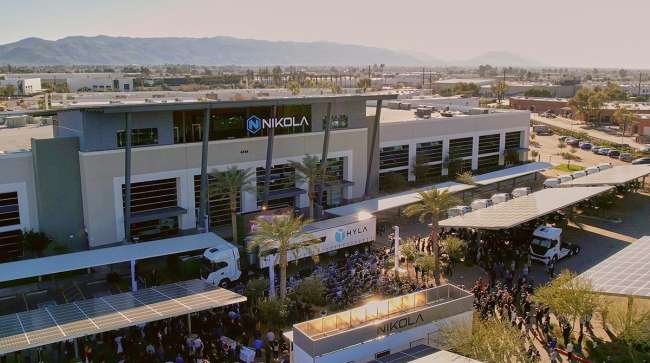Staff Reporter
Nikola Q2 Loss Widens on Romeo, European Exits

[Stay on top of transportation news: Get TTNews in your inbox.]
Losses at Nikola Motor widened year-over-year in the second quarter of 2023 after the truck maker took a $77.8 million hit to its balance sheet on its exit from Europe, closing its Romeo Power unit and refocusing on hydrogen-powered Class 8 trucks.
Nikola posted a Q2 net loss of $217.83 million, compared with a loss of $173 million in the same period a year earlier, it said. On a diluted earnings per share basis, however, the company’s loss more than halved to 20 cents from 41 cents in the year-ago period.
Nikola’s Q2 revenue declined 15% to $15.36 million, down from $18.13 million in the same period a year earlier. The company’s loss from continuing operations narrowed to $140 million compared with $173 million in the year-ago period.
Nikola acquired commercial vehicle specialist Romeo in August 2022 for $144 million. Up until then, Nikola had been Romeo’s biggest customer. During Q2, the company also retooled its Coolidge, Ariz., manufacturing plant for a shift away from producing battery-electric trucks to fuel cell electric vehicles.

Steve Girsky (left) has replaced Michael Lohscheller as CEO. (Nikola Corp.)
Serial production of the FCEVs began July 31 at the Coolidge facility. Following the retooling, the current production capacity of the facility is 2,400 trucks per year, the company said.
The first FCEV customer deliveries are expected to take place in September. To date, 18 customers have placed orders for over 200 FCEVs with Nikola and dealers.
As a result of the retooling, Nikola in late May shut the Coolidge facility, which until then had been concentrating on production of the Class 8 Tre BET. Nikola had 139 BETs in inventory at company facilities at the end of the second quarter of 2023, while dealers had 92 BETs on forecourts at the same point, it said Aug. 4.
Nikola’s then-CEO Michael Lohscheller said during its quarterly earnings call that Nikola expects to produce 100 FCEV trucks by the end of the year. Nikola aims to restart production of BETs in early 2024, he said.
The average selling price for Nikola BETs going forward is expected to be between $300,000 and $320,000, Lohscheller said, adding that the average selling price for hydrogen trucks will be between $400,000 and $425,000.

Pasterick
Nikola expects to make between 60 and 90 deliveries in Q3 2023, CFO Stasy Pasterick said, adding that the company expects full-year 2023 deliveries of between 300 and 400 trucks.
On its path to breaking even in 2025, Nikola will need to sell 1,000 trucks in 2024 to meet that goal, Pasterick said, and sell between 1,500 and 2,000 trucks in 2025.
Fuel cell power modules for Nikola FCEVs will be built and shipped to Coolidge by Bosch in 2023, the company said, but Nikola expects a fuel cell power module assembly line to be completed at the Arizona facility in the fourth quarter of 2023.
To build out the facility, Nikola will need more funds and received positive news on this front a day before the Q2 earnings were released. The company on Aug. 3 said shareholders had approved during its annual meeting a proposal to allow the company to issue more stock to finance manufacturing of the FCEV and modules, as well as its refueling system ambitions.
The annual meeting had been adjourned twice previously because not enough shareholders voted for the plan, which the cash-strapped company said was key to building the Class 8 trucks.
Since the last adjournment in July, however, Delaware Gov. John Carney approved an amendment to Section 242 of the Delaware General Corporation Law. As a result, amending a company’s certificate of incorporation to increase its share count no longer required a majority of the outstanding common stock to back the plan, just a majority of the shares voting.
The company expects to need $600 million to fully fund its business plan, Pasterick said. The company’s spending is expected to be concentrated in the second half of 2023 and the first half of 2024 as it ramps up FCEV production, she said.
Want more news? Listen to today's daily briefing above or go here for more info
However, Lohscheller will not be at the company to see this through. Lohscheller stepped down as president and CEO Aug. 4 and will depart the company’s board of directors effective Aug. 31. Stephen Girsky, board chairman since September 2020, replaced Lohscheller as CEO.
Lohscheller is stepping down due to a family health matter and will return to Europe, the company said. He joined Nikola in February 2022 and was promoted to CEO on Jan. 1. Lohscheller worked for Mitsubishi Motors Europe, Volkswagen Group of America and Opel Automotive before joining Nikola. Girsky is a former General Motors executive and auto industry analyst at investment bank Morgan Stanley.




